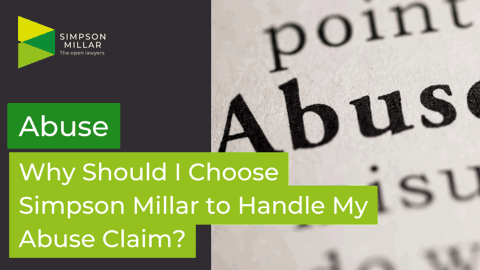
Liam Goggin
Director of Public Law Practice Area
If you’ve been affected by domestic abuse, you arent alone. Our experienced solicitors are able to help you get the support you need and provide you with details of organisations who may be able to help.
You can access experienced legal representation, possibly with legal aid to help you make a claim in respect of the abuse you have suffered.
In addition our family law team may also be able to help you take action and obtain an injunction very quickly.
Domestic abuse can happen to anyone and it’s not your fault.
You could suffer domestic abuse from a partner, a child or other family member.
Don’t suffer alone. We can help you to take all the legal steps to protect yourself.
Get in touch with one of our experienced Domestic Abuse Solicitors.
At Simpson Millar we want to help you. We are proud of our track record and the comments from our clients which is at the end of the day why we do the work we do.
Our expert team of Domestic Abuse Solicitors understand this extremely complex and sensitive area of law and aim to make the process as straightforward and stress-free as possible
We’ll always talk to you in clear, straightforward language, and won’t use complex legal jargon
We’re members of the Association of Child Abuse Lawyers (ACAL) and we make sure to subscribe to its code of conduct
We’ll talk to you about your legal costs in advance and guide you through a No Win, No Fee agreement.
It can be a difficult decision to make, but for some abuse survivors, making a claim through the civil courts can be the only way to get some form of justice and recognition, particularly if the abuser was not convicted in a criminal court.
It’s not often about the compensation you’ll get in a civil claim, but any compensation you do receive should reflect as much as possible the pain and suffering you’ve been through and may still be going through now. It can also help you to get the treatment you need to help your recovery from the abuse you’ve suffered.
We’re happy to talk you through the claims process so you’re clear about what will happen and you’re under no obligation to make a claim. We want you to be comfortable with the process and with your Solicitor so get in touch for a free, no obligation conversation.

At Simpson Millar we want to help you. We are proud of our track record and the comments from our clients which is at the end of the day why we do the work we do
There are some other orders you may want to apply for at the same time as the Non-Molestation Order, depending on your circumstances. They are:
Occupation Order – if you are sharing a property with the respondent, this order can give you the right to stay in the property in the short term. It will exclude them from the property for a certain period of time whilst you sort out somewhere else to live
Prohibited Steps order – this order stops the respondent from taking the children from you
If Social Services have been in touch with you and you’re worried, we can help. See more information on our Care Proceedings page or call us now on 0800 260 5010 for free legal advice.

Domestic violence is often perceived only as physical acts of violence – But it’s much more complicated than that. A lot of the time, people witnessing or experiencing this kind of behaviour don’t know that it is domestic violence. It therefore often goes on unreported and is often ignored. But domestic violence can happen at any point in a person’s relationship and there are many forms that it can take.

In October 2021, the BBC revealed that 13,000 domestic violence cases in England and Wales had been dropped by the police in the last five years as victims had not reported the crimes within the six-month time limit.

The government has announced a new plan, which aims to tackle domestic violence and provide help for those in need of support. Here we discuss the realities of domestic abuse in the UK, and how the government’s new plan aims to make a change.
Fill in the form below to get in touch with one of our dedicated team members, or call our team today on: 0800 260 5010